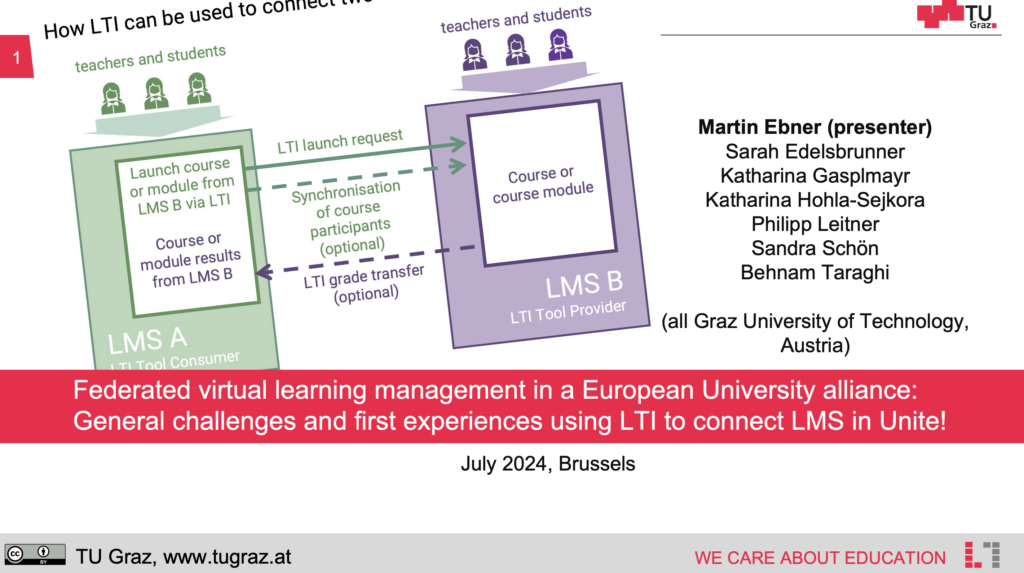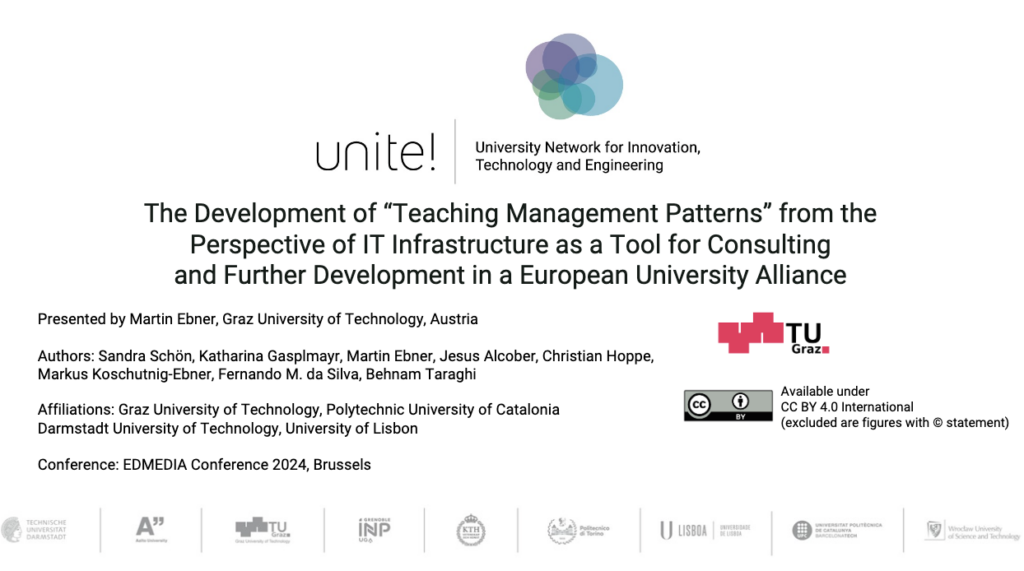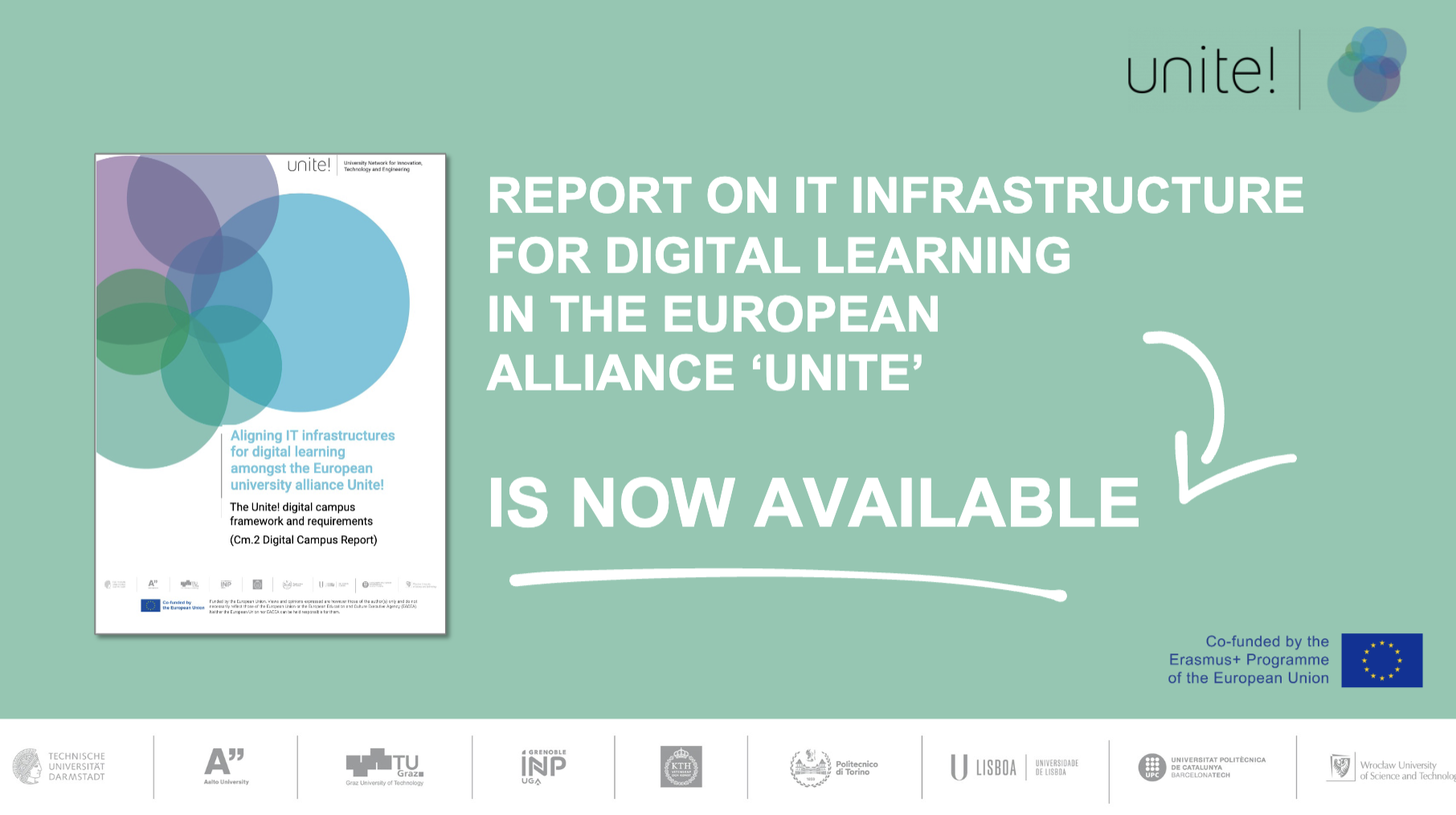The next presentation at this year’s ED-Media conference is „Federated virtual learning management in a European University alliance: General challenges and first experiences using LTI to connect LMS in Unite!„. Find here our slides:


Digitale Lehre an und rund um der Technischen Universität Graz
The next presentation at this year’s ED-Media conference is „Federated virtual learning management in a European University alliance: General challenges and first experiences using LTI to connect LMS in Unite!„. Find here our slides:

The next presentation at this year’s ED-Media conference is „The Development of „Teaching Management Patterns“ from the Perspective of IT Infrastructure as a Tool for Consulting and Further Development in a European University Alliance„. Find here our slides:

Our MOOC on „Open Educational Resources in Higher Education“ for the European alliance UNITE! is reaching the last week – number 4 :-). This time we are discussing the role of OER within Open Science and strategies for implementation in higher education:
And don’t to forget to change the language, all videos are offered in 11 different languages: [free registration link to the open course]
Our MOOC on „Open Educational Resources in Higher Education“ for the European alliance UNITE! is reaching week three. This time we are discussing how to produce and publish OER and you can learn about the OER-Canvas. So I guess it will be interesting content and you can join us for free 🙂
And don’t to forget to change the language, all videos are offered in 11 different languages: [free registration link to the open course]
Es freut uns sehr, dass nach langer Vorbereitung es nun endlich soweit ist – der MOOC zu „Open Educational Resources in Higher Education“ startet und es ist ein MOOC mit vielen Besonderheiten, denn das Ziel ist hiermit eine Lehrveranstaltung im Rahmen der europäischen Allianz UNITE! anzubieten. Damit stehen wir unweigerlich vor der schwierigen Herausforderung verschiedenster Landessprachen, wenn wir nicht uns generell auf eine verständigen. Im Zeitalter künstlicher Intelligenz haben wir daher uns zu einem Experiment entschlossen – wir wollten die Videos in allen Landessprachen anbieten, vorgetragen von KI-generierten Avataren und unterstützt von KI-Software was die Übersetzungen betrifft. Wie gut uns das gelungen ist, kann man nun einsehen – also anmelden und mitmachen, wir hoffen ja auch, dass der Inhalt ansprechend ist.
Open Educational Resources (kurz OER) sind Bildungsmaterialien, die frei zugänglich sind und bearbeitet, angepasst und weitergegeben werden können, ohne gegen Urheberrechte zu verstoßen. Das gelingt, weil dazu sog. „offene Lizenzen“ oder gemeinfreie Materialien genutzt werden.
In diesem Kurs wird in das Konzept von Open Educational Resources für Studierende und Lehrende an Hochschulen eingeführt. OER sind nicht nur für internationale Vereinigungen wie UNESCO ein wichtiges bildungspolitisches Thema, OER sind auch ein Bestandteil der Forderung nach „Open Science“.
Im Kurs wird zudem gezeigt, wie und wo OER gesucht und veröffentlicht werden können. Und natürlich werden auch offene Lizenzen wie CC-0, CC BY und CC BY-SA erklärt.
Hintergrund dieses mehrsprachigen MOOC-Angebots ist das gemeinsame Projekt „Unite! OER courses“ aller neun Hochschulen der europäischen Universitätsallianz Unite!.
Das erste Video im MOOC (in der Sprache deutsch):
[Link zur kostenlosen Anmeldung]
WICHTIG: wenn man eine andere Sprache ausprobieren möchte, einfach im Menü die entsprechende wählen, die Videos werden dann automatisch in dieser Sprache zur Verfügung gestellt.
Und nein, weder Sandra noch ich sind einem dieser Videos zu sehen, es sind ausschließlich unsere Avatare 🙂
Wir durften einen Gastbeitrag auf OERinfo veröffentlichen über den OER-Kurs der am 6.5.2024 in 11 Sprachen starten wird:
Für mehr OER in Hochschulen: Der neue Online-Kurs zu offenen Bildungsressourcen vereint geballte humane und künstliche Intelligenz, die für Mehrsprachigkeit sorgt. Dank der offenen Lizenz finden die Inhalte schon vor Start des MOOCs „OER in Higher Education“ Anwendung.
[Link zum MOOC und zur kostenlosen Teilnahme]
[Link zum Beitrag auf OERinfo.de]
We are very happy that we can announce our UNITE! course on Open Educational Resources (OER) for at least all partner universities but also beyond:
Dive into the realm of OER, where educational materials are openly accessible, editable, and shareable. Discover how to utilize OER ethically and effectively, and earn badges and credits for your accomplishments!
[press release @ UNITE!’s homepage]
[MOOC @ imoox.at for free access]
Regarding the topic of Open Educational Resources, there will be a new MOOC available on the platform iMooX.at starting from May 6, 2024. The free online course „OER in Higher Education“ by the European University Alliance „Unite!“ and other cooperating partners will be accessible in several languages, and the learning videos are created with the help of artificial intelligence. The avatars of the course instructors – me and Sandra Schön from TU Graz – will now speak in French, Italian, Indonesian, and other languages in the course videos of the four units.
Link to the MOOC – join us for free: https://imoox.at/course/OERinHE
After more than one year of exciting work in our community we are a little bit proud to present our first technical report about „Aligning IT infrastructures for digital learning amongst the European university alliance Unite! – The Unite! digital campus framework and requirements„:
The European university alliance „Unite!“ has embarked on a mission to bring together their higher education landscape. As part of this ambitious endeavour, the Erasmus+ Work Package 2, called “Community 2 Digital Campus” or „Cm.2“ for short, was established to shape and implement a cutting-edge digital campus framework within the alliance. The purpose of the present requirement analysis is to collect and list all the key technological, organizational, and legal needs and requirements for an up-to-date European digital campus. This analysis is built upon desk research, utilizing additional methods such as an online survey and stakeholder discussions within the entire Unite! alliance. The requirements analysis results are provided against the background of a short introduction (chapter 1), an overview of platforms for learning management in European university alliances (chapter 2), and a description of the analysis’ procedures, which are the development of descriptions of digital learning and teaching infrastructures of all partners, a survey of the status quo concerning European Student Card Initiative, a survey amongst e-learning support teams, an interactive event for stakeholders and literature and projects desk research (chapter 3). Chapter 4 introduces the federated infrastructures of the Unite! alliance, especially the Metacampus as a federated learning management system based on Moodle. Chapter 5 provides detailed descriptions (including visualizations) of all partners’ digital infrastructures for learning and teaching. Chapter 6 then shares the status quo of the European Student Card Initiative implementation by all partners. Chapter 7 presents five core requirements identified through the analysis, which are the requirements of (a) interoperability between the digital infrastructures of partners and with European standards, (b) the implementation of decision-making concerning IT infrastructure for the digital campus: the Technical Commission, (c) the strategic support for the effective utilization of existing IT systems, especially the Metacampus, (d) clarifying future (learning) scenarios, mobility, and other issues relating to development of the IT infrastructure, and (e) budgetary considerations for the development and maintenance of federated systems. Finally, chapter 8 sketches the next steps and the future of Community 2 Digital Campus and its tasks, and presents (a) the work plan and organisational structure for Community 2 Digital Campus, (b) further development of Metacampus support and resources (T2.3), (c) update of Metacampus and organisational development of support requests, (d) ESCI: improvement of service, (e) eduGAIN maintenance and further development (T2.6), (f) piloting of LTI and integration of MOOCs (T2.6), (g) implementation of meta-data standards for course description (T2.5, T2.6), and (h) support of openness and innovation (T2.1).
The report is open licenced available here:
[repository @ TU Graz]
[ResearchGate]
Furthermore find here some few slides acting as a kind of summary:

Reference: Ebner, M., Schön, S., Alcober, J., Bertonasco, R., Bonani, F., Cruz, L., Espadas, C., Filgueira Xavier, V., Franco, M., Gasplmayr, K., Giralt, J., Hoppe, C., Koschutnig-Ebner, M., Langevin, E., Laurent, R., Leitner, P., Martikainen, J., Matias, J., Muchitsch, M., … Würz, A. (2024). Aligning IT infrastructures for digital learning amongst the European university alliance Unite! – The Unite! digital campus framework and requirements (1.0). Unite! Community 2 Digital Campus, Graz University of Technology. https://doi.org/10.3217/36yen-0wy21